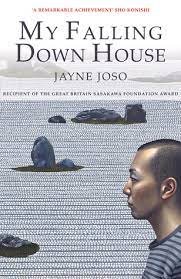My Falling Down House by Jayne Joso (Seren Books)
My Falling Down House is Jayne Joso’s third novel and the first one set in Japan. The book won the Great Britain Sasakawa Foundation Award whose aim is to “promote understanding and cooperation between the U.K. and Japan” in a variety of fields, including literature.
Takeo Tanaka is a young man in his twenties who narrates the entire story. A year ago, he had everything a man could want. He was young and ambitious, and had a good job with a great salary. He had a beautiful girlfriend he lived with in one of Tokyo’s more upscale neighborhoods. He seemed set for life.
A year ago when he was out drinking with co-workers, he got so drunk that when he woke up, he found himself in an abandoned and dilapidated house. It seems he had also bought a cello before finding his way to this dwelling.
It was sometime after his twenty-fifth birthday when a financial crisis occurred. Takeo lost his job, his girlfriend, and his home. For a while Takeo managed to sleep at the office creating a small nest under his desk with just a box and a blanket. His co-worker Shizuko nicknamed him the Box Man. But once he lost his job, he could no longer sleep at the office.
After becoming jobless and homeless, Takeo decided to seek out the old house where he once spent the night in a drunken stupor. He was drawn to the place. He felt there was “a feel for nature here, a sense of a slow and simple way of living. A forgotten way of living.” He told himself it was only temporary. Once he recovered, he would move on.
So begins Takeo’s new life of disappearing from society. He isolated himself by taking residence in an old house located on the grounds of a temple. He encounters a cat, finds his cello, and slowly settles into the life of a hermit. His supposed temporary stay extended to one season and then another.
The longer Takeo stays at the house, he believes he sees or is being haunted by a yokai, a spirit or shapeshifter. As the summer turns to autumn and autumn turns to winter, Takeo seems to drift further and further away from the reality of life. It is becoming harder and harder for Takeo to determine what is real and what is fantasy. He thinks he may be slowly going crazy. In order to keep his sanity, he works on a number of projects just to keep his mind busy but still, he does not know if he is on his way to recovery.
As Takeo had no room in a home to hide himself away in, he installed himself in a fragile wood and paper house. This phenomenon of hiding oneself away from people and society has become a very big problem in Japan. A new term was given to this phenomenon. It is called hikikomori in Japanese. It translates to “social withdrawal” in English. It can be described as a mild form of depression.
Takeo’s story can be the story of any salaryman in Japan. Joso makes Takeo out to be an anti-hero. A man you hope will come out of his loneliness and self-pity to become a productive member of society once again. Anybody who has had a setback in life can relate to Takeo, however I believe there is no shame in asking for help. ~Ernie Hoyt
